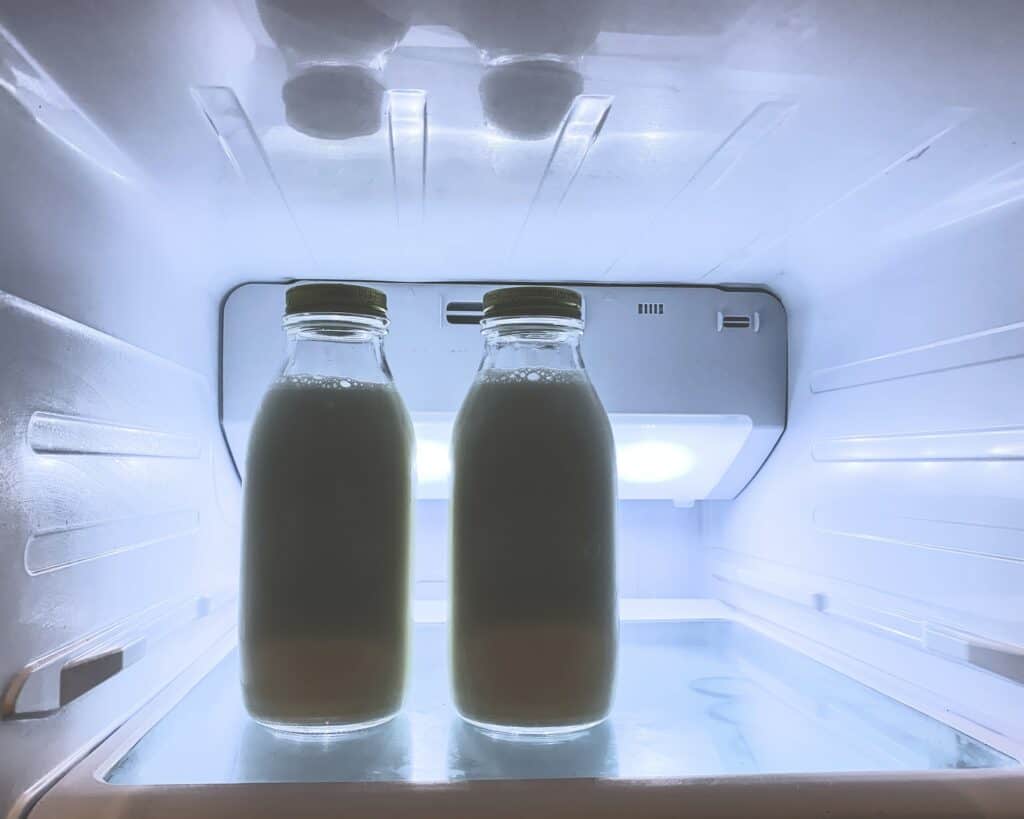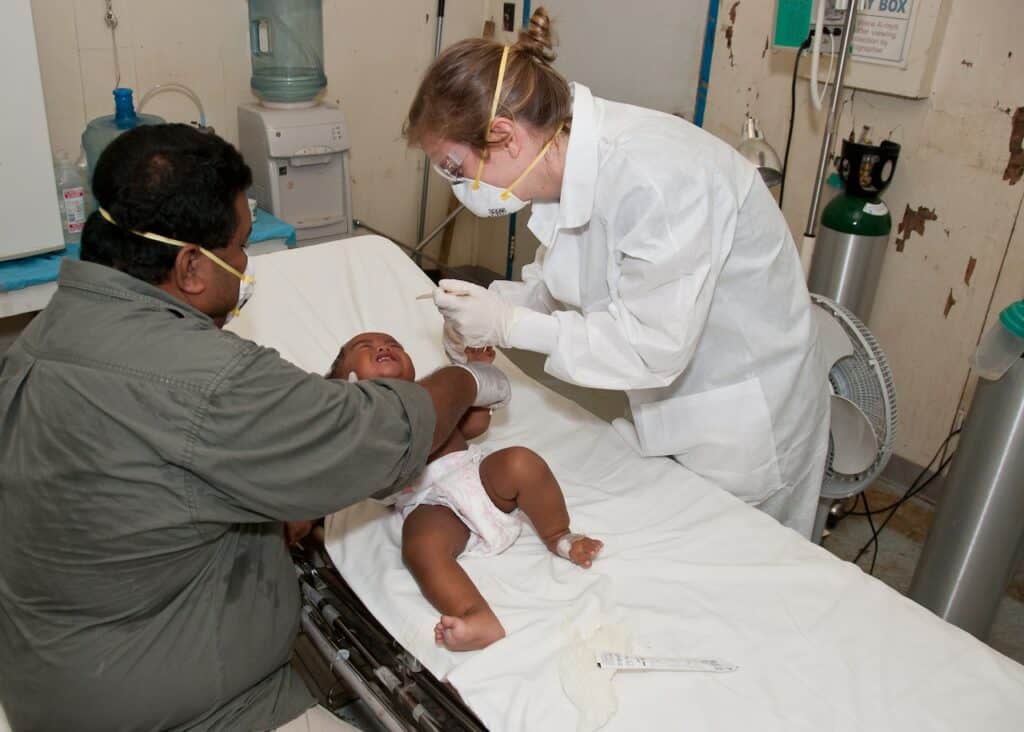Breast milk is the ideal source of nutrition for babies as it contains all the necessary nutrients required for their growth and development. However, storing breast milk incorrectly can lead to spoilage, which can be harmful to the baby. Spoiled breast milk can cause digestive issues, infections, and other health problems in infants.
Understanding what happens if baby drinks spoiled breast milk is crucial for new mothers. Breast milk is a living substance that contains bacteria, enzymes, and other components that aid in the baby’s development. However, when breast milk is not stored properly, bacteria can grow and multiply, causing it to spoil. It is essential to follow proper storage guidelines to prevent spoilage and ensure that the baby receives safe and healthy breast milk.
Identifying and handling spoiled breast milk is crucial to prevent the baby from consuming it. It is essential to know the signs of spoiled breast milk, such as a sour or rancid smell, curdled appearance, or a change in color. In case the baby drinks spoiled breast milk, there are specific steps that new mothers can take to prevent any adverse effects.
Key Takeaways
- Proper storage guidelines are crucial to prevent breast milk from spoiling.
- Identifying the signs of spoiled breast milk is essential to prevent the baby from consuming it.
- In case the baby drinks spoiled breast milk, specific steps can be taken to prevent any adverse effects.
Understanding Breast Milk
Breast milk is a complex and dynamic fluid that provides optimal nutrition and immunity for infants. It is composed of water, carbohydrates, proteins, fats, vitamins, minerals, and other bioactive substances that are essential for the growth and development of the baby.

Fresh breast milk is recommended for newborns as it contains a higher concentration of antibodies and immune cells that protect against infections and diseases. The composition of breast milk changes over time, with colostrum being the first milk produced in the first few days after birth. Colostrum is rich in immunoglobulins, growth factors, and other bioactive compounds that help build the baby’s immune system.
After colostrum, the composition of breast milk changes to provide the baby with the necessary nutrients for growth and development. The first milk that is produced during a feeding is called foremilk, which is rich in carbohydrates and proteins. As the feeding progresses, the milk changes to hindmilk, which is higher in fat and calories.
It is important to note that breast milk can spoil if it is not stored properly or if it is not consumed within a certain period. Spoiled breast milk can cause gastrointestinal upset, such as diarrhea or vomiting, in infants. Therefore, it is important to follow proper storage and handling guidelines to ensure that breast milk remains fresh and safe for the baby to consume.
In summary, breast milk is a complex and dynamic fluid that provides optimal nutrition and immunity for infants. Fresh breast milk is recommended for newborns, and the composition of breast milk changes over time to provide the necessary nutrients for growth and development. It is important to follow proper storage and handling guidelines to ensure that breast milk remains fresh and safe for the baby to consume.
How Breast Milk Can Spoil
Breast milk provides essential nutrients for a baby’s growth and development. However, if it is not stored properly, it can spoil and become unsafe for consumption.
Breast milk can spoil due to the presence of bacteria, which can multiply rapidly in warm temperatures. Room temperature is the ideal temperature for bacterial growth, so it is important to store breast milk in a cool place.
Storing breast milk in a refrigerator can help prevent spoilage and keep it fresh for up to four days. Freezing breast milk can extend its shelf life for up to six months. However, it is important to note that lipase, an enzyme naturally present in breast milk, can cause the milk to develop a rancid taste and smell over time, even when stored properly.
Spoiled breast milk can have a sour or off smell and taste, and it may appear lumpy or discolored. Consuming spoiled milk can lead to food poisoning, which can cause symptoms such as nausea, vomiting, and diarrhea.
To prevent breast milk from spoiling, it is important to follow proper storage guidelines. This includes washing hands before pumping or handling breast milk, using clean bottles and pump parts, and storing milk in a clean container with a tight-fitting lid.
In summary, breast milk can spoil due to bacterial growth, and it is important to store it properly to prevent spoilage. Storing breast milk in a refrigerator or freezer can help extend its shelf life, but it is important to be aware of the potential for rancidity due to the presence of lipase.
Storage Guidelines for Breast Milk
Proper storage of breast milk is crucial to ensure that it remains safe for the baby to consume. Here are some guidelines to follow when storing breast milk:

- Always wash hands thoroughly before handling breast milk.
- Use clean pump kit and breast milk storage bags or containers.
- Label all containers with the date and time the milk was expressed.
- Store breast milk in the back of the refrigerator or freezer, where the temperature is the coldest.
- Store breast milk in small amounts (2-4 ounces) to prevent waste.
- Use breast milk storage bags or hard-sided containers made for storing breast milk.
- Avoid using plastic bags or containers that are not made for storing breast milk, as they may leach chemicals into the milk.
- Do not add freshly expressed breast milk to already frozen milk.
- Do not store breast milk in the door of the refrigerator or freezer, as the temperature fluctuates frequently.
- Breast milk can be stored in the refrigerator for up to 4 days and in the freezer for up to 6 months.
- Breast milk can be stored in a deep freeze for up to 12 months.
By following these guidelines, parents can ensure that their baby’s breast milk is safely stored and ready to use when needed.
Identifying Spoiled Breast Milk
Breast milk is a valuable source of nutrition for babies, providing them with the necessary nutrients to grow and develop. However, it is important to ensure that the breast milk is fresh and not spoiled. Here are some ways to identify spoiled breast milk:
Smell and Taste
Spoiled breast milk may have a sour or rancid smell and taste. It may also have a metallic or off-flavor. If the breast milk smells or tastes bad, it is best to discard it.
Color and Separation
Fresh breast milk is typically white or bluish-white in color. However, if the breast milk has a yellow or brownish tint, it may be spoiled. Additionally, spoiled breast milk may separate, with the fat separating from the milk and forming chunks. If the breast milk appears chunky or has a strange texture, it is best to discard it.
Defrosting
When defrosting frozen breast milk, it is important to check for signs of spoilage. If the breast milk has a sour smell or taste, or if it appears curdled, it may be spoiled. Additionally, if the breast milk has a soapy smell or taste, it may be high in lipase, which can cause the milk to spoil more quickly.
Signs of Spoiled Breast Milk
In addition to the above indicators, there are other signs that breast milk may be spoiled. These include:
- Mold or other visible signs of contamination
- A bad or off smell
- Curdled or clumpy appearance
- Metallic or soapy smell or taste
- Fat separation in breast milk
If any of these signs are present, it is best to discard the breast milk rather than risk feeding it to the baby.
In summary, it is important to be able to identify spoiled breast milk to ensure that babies are receiving fresh and safe nutrition. By checking for signs of spoilage such as smell, taste, color, separation, and other indicators, parents can ensure that their babies are receiving the best possible nutrition from breast milk.
Effects of Consuming Spoiled Breast Milk
Consuming spoiled breast milk can have a range of effects on a baby’s health. The severity of the effects can vary depending on the extent of contamination and the baby’s age and overall health.

One of the most common effects of consuming spoiled breast milk is an upset stomach. The baby may experience nausea, vomiting, and diarrhea. These symptoms can lead to dehydration, which can be dangerous, especially in younger babies.
In some cases, consuming spoiled breast milk can also cause a fever, which is a sign that the baby’s body is fighting off an infection. If the fever persists or is accompanied by other symptoms, such as lethargy or difficulty breathing, it is important to seek medical attention.
Babies who consume spoiled breast milk may also experience discomfort and fussiness. They may cry more than usual and have trouble sleeping. These symptoms can be distressing for both the baby and the parents.
In some cases, consuming spoiled breast milk can lead to food poisoning. This is more likely to occur if the milk has been contaminated with bacteria or other harmful pathogens. Symptoms of food poisoning can include fever, vomiting, diarrhea, and stomach cramps.
Overall, it is important to take steps to prevent breast milk from spoiling and to discard any milk that has gone bad. If a baby does consume spoiled breast milk, it is important to monitor their symptoms and seek medical attention if necessary.
Preventing and Handling Spoiled Breast Milk
Breast milk is a valuable source of nutrition for babies, but it can spoil if not handled properly. Spoiled breast milk can contain harmful bacteria that can make a baby sick. To prevent this from happening, it is important to follow proper storage guidelines and hygiene practices.

Storage Guidelines
Breast milk should be stored in a clean container that has been washed with warm, soapy water and rinsed well. Plastic storage bags designed for breast milk are also available and can be convenient for storing and freezing milk.
Freshly expressed breast milk can be stored at room temperature for up to four hours. If the temperature is above 77°F (25°C), the milk should be used within two hours. Breast milk can also be stored in the refrigerator for up to four days, or in the freezer for up to six months.
Frozen breast milk should be thawed in the refrigerator or under warm running water. Do not thaw breast milk in the microwave or in warm water that is above body temperature, as this can cause harmful bacteria growth.
Handling and Hygiene
When handling breast milk, it is important to wash hands thoroughly with warm, soapy water before expressing or handling milk. Pump parts should also be washed and sterilized according to manufacturer instructions.
To prevent breast milk from spoiling, it is recommended to scald freshly expressed milk before storing. This involves heating the milk to a high temperature for a short period of time to kill any harmful bacteria. This step is not necessary if the milk will be used within four hours.
If a baby drinks spoiled breast milk, they may experience symptoms such as vomiting, diarrhea, and fever. If you suspect that your baby has consumed spoiled milk, contact a healthcare provider for guidance.
By following proper storage guidelines and hygiene practices, parents and guardians can help ensure that their baby receives safe and nutritious breast milk. The Centers for Disease Control and Prevention (CDC) provides additional guidance on safe handling and storage of breast milk.
When to Consult a Healthcare Professional
If a baby drinks spoiled breast milk, it is important to monitor them for any signs of illness or discomfort. In some cases, it may be necessary to consult a healthcare professional.

If the baby is a newborn or has a weakened immune system, it is especially important to seek medical attention. Newborns are more susceptible to infections and may not be able to fight off illnesses as effectively as older babies. Similarly, babies with weakened immune systems may be at a higher risk of developing infections or illnesses from spoiled breast milk.
If the baby shows any signs of illness, such as vomiting, diarrhea, fever, or fussiness, it is important to contact a healthcare professional. These symptoms could be a sign of an infection or disease, and prompt medical attention may be necessary.
If the baby is crying excessively or seems uncomfortable after drinking spoiled breast milk, it may be helpful to consult an International Board Certified Lactation Consultant (IBCLC). An IBCLC can provide guidance on breastfeeding techniques and help ensure that the baby is getting enough milk.
Deborah Dominici, an IBCLC based in Hawaii, recommends contacting a healthcare professional if the baby has consumed spoiled breast milk. She emphasizes the importance of seeking medical attention if the baby shows any signs of illness or discomfort.
In summary, if a baby drinks spoiled breast milk, it is important to monitor them for any signs of illness or discomfort. If the baby is a newborn, has a weakened immune system, or shows any signs of illness, it may be necessary to consult a healthcare professional. An IBCLC can also provide guidance on breastfeeding techniques and help ensure that the baby is getting enough milk.
Frequently Asked Questions
Can drinking spoiled breast milk harm a baby?
Yes, drinking spoiled breast milk can harm a baby. It can cause gastrointestinal problems such as diarrhea, vomiting, and abdominal pain. In some cases, it may also lead to more serious health issues.
What are the symptoms of a baby drinking spoiled breast milk?
The symptoms of a baby drinking spoiled breast milk may include vomiting, diarrhea, abdominal pain, and fever. In some cases, the baby may also refuse to feed or appear lethargic.
How long does it take for breast milk to spoil?
Breast milk can spoil quickly if it is not stored properly. In general, it is recommended that breast milk be used within 4 hours if it is at room temperature, within 24 hours if it is in the refrigerator, and within 6 months if it is in the freezer.
What should I do if my baby drinks spoiled breast milk?
If your baby drinks spoiled breast milk, it is important to monitor them closely for any signs of illness. If your baby shows any symptoms, contact your pediatrician immediately.
Is it safe to give a baby expired breast milk?
No, it is not safe to give a baby expired breast milk. Expired breast milk may contain harmful bacteria that can cause illness in infants.
How can I prevent my breast milk from spoiling?
To prevent breast milk from spoiling, it is important to store it properly. Breast milk should be stored in a clean container with a tight-fitting lid, and it should be refrigerated or frozen immediately after pumping. It is also important to use breast milk within the recommended timeframes.

Iesha is a loving mother of 2 beautiful children. She’s an active parent who enjoys indoor and outdoor adventures with her family. Her mission is to share practical and realistic parenting advice to help the parenting community becoming stronger.
